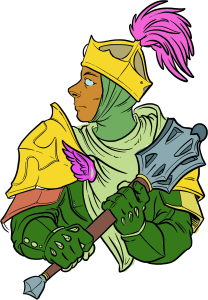By Jason Campbell
When I run a TTRPG campaign we have a mostly emergent story. I don’t write a prewritten story, my preferred way is to give the characters three plot threads and let them choose what they’d like to do. Usually the plot thread is an idea with only the first few scenes established. My question today is; should threads appeal to the players, or to their characters?

Some Background
I’m currently running a Numenera game (the sci-fantasy TTRPG from Monte Cook Games). The players have played with me in previous Dungeons & Dragons campaigns. We’ve played about a dozen sessions and the characters had wrapped up plot arcs and were deciding what they wanted to do next, and one of the players suggested they explore the Jade Colossus, a huge monument which can be explored like a mega dungeon. A couple of players have played in other Numenera campaigns and knew that there was a prewritten adventure setting called Jade Colossus which is well regarded.
I was prepping the session where they’d arrive at the town surrounding the Colossus, and I was looking for reasons the characters would want to explore the interior.
Motivating the Characters
My players are all good roleplayers, and like constructing strong characters. Some come into session 1 with a deep backstory and a detailed idea of who the character is. Others have a basic idea and the details emerge through play. Either way after a short time I have a good idea what each character is looking for. In this group I know there’s a character who is seeking clues to the magic/mechanics of past civilizations, so I made sure there were hints about magics they might find inside the Colossus. Another character is the Nano type which is a sort of wizard. In the first dozen sessions I sprinkled in clues that might appeal to this Nano character in particular which didn’t arouse as much interest as I’d thought. So in looking for things to tempt this character I’d thought about some ancient magic lore, but I wasn’t sure that would work.
Motivating the Players
In our last D&D campaign, the character playing the Nano played a Druid, and the most prominent thing about the Druid was their empathy. They tended to sympathise and protect other characters and NPCs. I realized that in our Numenera campaign the Nano character also had empathy for NPCs, and it probably was something about the player that they enjoy and brought it to many characters.
The characters had an NPC with them, a young naive woman who they’d met recently. I thought that if there was a reason to explore the Colossus that involved that NPC it would likely tempt the Nano’s player. So I made the NPC have a brother who was lost, with some clues that her brother might be in the maze within the Colossus. This thread interested the Nano but it was built on what I knew about the player, as much as anything about the character.
Conclusion
Is there a best way to create plot threads? Some people might feel that in game plot threads should only be directed at a character, not a player. But ultimately we’re all people playing a game. Since we’re all here to have fun as players, maybe it makes just as much sense to have in-game plot threads that appeal to the players who are playing the game.
What do you think? Do you develop plot threads, and do you aim them at players or characters? Let us know in the comments!




